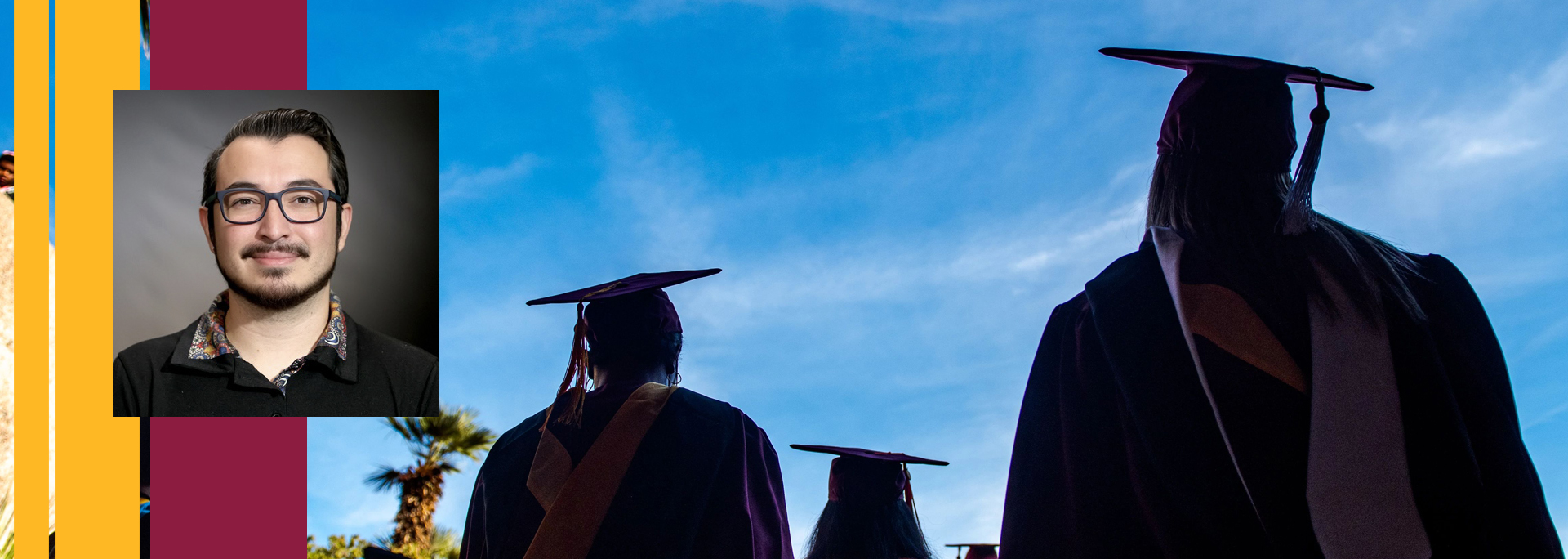Editor’s note: This story is part of a series of profiles from ASU News highlighting notable fall 2023 graduates.
Albert Serna Jr. wanted to be a journalist for as long as he can remember. His passion for journalism developed when he was a child.
“I remember my grandfather used to read the newspaper, and it was special being there with him as he read it. He would show me the comics, and sometimes he would read the paper aloud for me. We also watched the news together,” Serna said.
The time spent with his grandfather instilled a love of journalism in Serna, one that would deepen as he learned about the field.
“Investigative journalism as a focus grew out of my experience with reporting. I wanted to tell deeper stories that facilitated change,” he said.
Years later, he has completed his Master of Arts in investigative journalism from Arizona State University’s Walter Cronkite School of Journalism and Mass Communication.
Question: Why did you choose ASU?
Answer: ASU’s status as a Hispanic-Serving Institution aligned with my background in journalism and queer ethnic studies, providing the ideal environment at the intersection of race, identity and journalism. My time at ASU proved transformative, exceeding my expectations.
Q: What’s something you learned while at ASU — in the classroom or otherwise — that surprised you or changed your perspective?
A: In terms of my academic journey, a pivotal moment occurred during (Cronkite Professor and Knight Chair in Journalism) Sarah Cohen’s data journalism class. Prior experiences with data had intimidated me, and I struggled to grasp its complexities. However, Sarah Cohen provided a supportive environment that allowed me to explore and embrace the intricacies of data journalism. Her guidance not only built my confidence but also made me realize the importance of stepping out of my comfort zone.
I learned the importance of embracing my imperfections and appreciating growth in unfamiliar situations. The graduate program was a valuable learning stage, teaching me that perfection isn’t a prerequisite for success. Now, I approach challenges with confidence, understanding that being authentically “me” is more than enough.
Q: Which professor taught you the most important lesson while at ASU?
A: In my ASU graduate program, professors aren’t just educators. They are also mentors and leaders. While every professor contributed significantly to my growth, Maud Beelman stood out during my final semester at the Howard Center (for Investigative Journalism). Her dedication to excellence, pushing me beyond my perceived limits, instilled a desire for continuous improvement.
Q: What’s the best piece of advice you’d give to those still in school?
A: First and foremost, school can be rough in so many ways, and it can get overwhelming to say the very least. Find people who will support, uplift and hold you accountable. When you do, lock arms and grit your teeth; they’re going to be the ones who help you get through the tough times and the good times.
Every journey is different, and success isn’t measured by how many people you beat or how you compare to the next person. It’s measured in the joy you get from your work and the bonds you build with your peers. Take however long you need to get to where you’re going; just remember that kindness is magic.
Q: What was your favorite spot on campus, whether for studying, meeting friends or just thinking about life?
A: During the spring and summer, I spent considerable time at the Howard Center, particularly since I was part of the investigative cohort, and that served as our dedicated space. If I wasn’t in the Howard Center, you’d likely find me on the fourth floor, sharing the common area with fellow members of the MAIJ group. So, while the Howard Center was a central hub, my presence was also spread out across other spaces.
Q: What are your plans after graduation?
A: Having completed my program in August, I transitioned to a fellowship with MuckRock, coinciding with the period between the end of school and the commencement of my fellowship. A word of advice: Avoid this overlap. Take a solid two weeks to decompress post-graduation. Currently at MuckRock, my fellowship concludes in January. I aspire to persist in my passion for reporting and contributing to impactful journalism, particularly in the realm of investigative journalism.
Q: What would you tackle if someone gave you $40 million to solve one problem on our planet?
A: I would focus on addressing the issue of queer youth homelessness with the allocated funds. It’s disheartening to think about the number of queer kids facing homelessness or hunger, and the goal would be to create solutions that provide shelter and support their basic needs. The aim is to establish environments that are protective, nurturing, loving and accepting. Reflecting on my own experience of coming out at age 16, I recognize the ongoing challenges and fears associated with that journey. Having close relationships with chosen family members, like my husband, is invaluable, creating a supportive network that fosters genuine understanding and acceptance.
